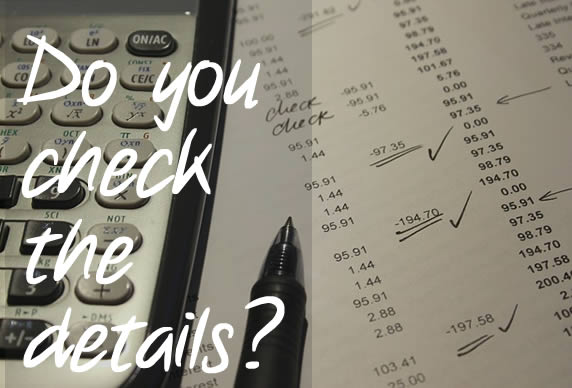Number blindness is a real affliction. It is not about being lazy learning your maths and it can seriously affect your personal finances.
A tiny number of people can look at a column of figures and just know what it adds up to. More people, perhaps 1 in 20, suffer from some degree of dyscalculia or “number blindness”, finding anything to do with numbers very difficult. Most of us will be somewhere in between.
Underestimating totals
The first symptom of number blindness is a tendency to under-estimate totals.
I can add up a column of numbers if I have to. I would prefer a spreadsheet or a calculator to assist, but I can do it “by hand” if I have to. It’s not something I enjoy – I never fancied being an accountant – but I don’t get a headache at the idea or worry that I’ll get it wrong.
Recently though I’ve been realising that I’m not much good at estimating the answer. And I almost always underestimate, which makes this much more of a problem.
Perhaps you have glanced at your credit card statement and thought “That doesn’t look right, those purchases can’t really add up to that much!” If you look closely and see that they do, you may have the same difficulty.
There could be a lot of reasons for this. Some of it is probably linked to focussing on the left most digit, so thinking 475.82 is about the same as 400. Long lists are harder and there your mind may be ignoring smaller figures as unimportant.
Behavioural economists talk about primacy and anchoring effects, odd numbers and other explanations – but for people interested in personal finance, the key thing is probably just to recognise that adding up numbers is something the human brain isn’t very good at.
Much harder without a list
If you find it hard to estimate without a list, you may have number blindness.
If estimating a total is difficult with the numbers written down in front of you, it gets a lot harder without the list. Apps and on-line banking make it simple to know how much is left in your bank account, but that doesn’t explain where your money went to.
If you are relying on a “rough total” in your mind of what you have spent this month on groceries or entertainment, you could well be a long way out. That matters a lot if you want to reduce your expenditure, you have to find where the “missing money” is actually going.
Almost impossible for “hidden figures”
If it’s hard to remember what you spent in the last few weeks, it’s a lot worse going back over years, especially if some of the figures are concealed inside larger transactions.
If you have investments, do you know how much the different layers of fees you are paying are adding up to? If you are ignoring these, it may well be that your broker and fund managers are making more money than you are 🙁 Of course it’s good to track what your return on investments is net of all charges, but if you don’t know what the charges are you may be missing an opportunity to change strategies and reduce those fees.
If you have a debts, do you know what you are paying in interest every year? I’ve recently been blogging about how you may be able to get a refund of interest from payday lenders (if you are reading this in the USA, don’t get excited, I’m afraid this is only for Brits!)
As part of putting a complaint in, I am encouraging readers to go back and add up what they have paid to a lender over the years. These are people that knew they had a big problem at the time but each month they just struggled through, never looking at what it was costing. People have been leaving comments saying:
- “I was absolutely gobsmacked at how much I borrowed and the interest I paid”
- “Going back and seeing it all in black and white is a real eye opener.”
- “I can’t believe it. It had no idea it was that much”.
Obviously payday loan interest is horrendous. But the same applies to credit card or mortgage interest. If you don’t know how much you are paying, there is little incentive to make changes that would reduce it.
Coping with ‘hidden’ charges is hard for anyone; people with number blindness find it harder yet.
Does online banking help or hinder?
I love techie stuff. A good budgeting app takes a lot of the stress out of managing your money. I would hate to go back and keeping a running total in my cheque book every time I didn’t pay cash for something. Contactless cards are soooo convenient.
But I think it’s important to recognise that all this convenience comes at a cost. And very often that is by making individual transactions and charges less prominent. Of course you can click through and see the details, but how often do you do that? I don’t think I do as often as I should.
In the end it’s the credit cards companies, the banks and brokers that profit if we just check the bottom line and don’t stop to think about how those charges and interest payments add up.
Is this a problem for you?
Do you think you may have number blindness? Or your partner does?
Number blindness can affect seriously your finances but it doesn’t have to: you can learn to manage it by honing your attention and using some of the personal finance tools available.
Editor’s note: This is a guest post by Sara Williams who writes about personal debt and credit ratings in Britain at Debt Camel.
Photo credit: https://pixabay.com/en/accounting-report-credit-card-761599/
